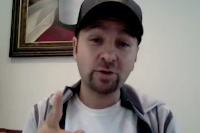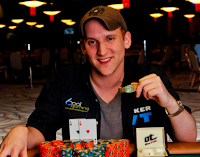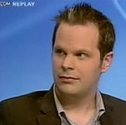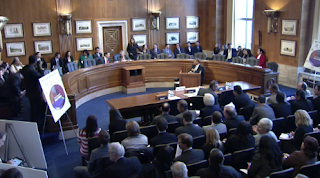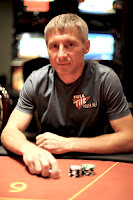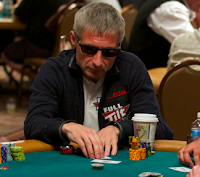Ode to the Middle Man
 “Online poker middle man pleads guilty in NYC,” goes the headline. That’s from the Wall Street Journal, reporting on Ryan Lang’s plea in the U.S. District Court in Manhattan. Lang, of course, was one of the 11 men listed in the DOJ’s “Black Friday” indictment unsealed last April 15, 2011.
“Online poker middle man pleads guilty in NYC,” goes the headline. That’s from the Wall Street Journal, reporting on Ryan Lang’s plea in the U.S. District Court in Manhattan. Lang, of course, was one of the 11 men listed in the DOJ’s “Black Friday” indictment unsealed last April 15, 2011.With the Unlawful Internet Gambling Enforcement Act of 2006 having essentially targeted the “middle man” when it came to U.S. players getting funds to and from online poker sites, Lang worked from Canada to help the sites get around the obstacle, using made-up companies and falsifying statements to facilitate the processing of payments.
The indictment describes Lang as having worked with all three of the targeted “Poker Companies” (PokerStars, Full Tilt Poker, and Absolute Poker/UB). Lang pleaded guilty to conspiracy to commit tax fraud, conspiracy to commit money laundering, accepting money in connection to Internet gambling, and violating the UIGEA.
Bradley Franzen, a payment processor, entered a plea agreement back in late May 2011, having bargained with prosecutors to cooperate in order to lessen his punishment. Brent Beckley, one of Absolute Poker’s co-founders who directed payments for the site, pleaded guilty to misleading banks in December 2011. And Ira Rubin, another payment processor, entered a plea agreement last month by admitting to some of the conspiracy counts against him.
Like Lang, those three are now all awaiting their sentences. Meanwhile both Chad Elie (another payment processor) and John Campos (part-owner and Vice Chairman of the Board at the now-closed SunFirst Bank in St. George, Utah) are fighting the charges against them and await trial.
That covers of all of the lower tier folks listed in the original indictment. PokerStars’ Isai Scheinberg (founder) and Paul Tate (payment director) continue to help manage the still-booming site as it serves players from around the world. TiltWare/Full Tilt Poker CEO Ray Bitar has been the frequent object of scorn and scrutiny since last spring, but hasn’t been heard from. Neither has Nelson Burtwick who helped direct payments for both Stars and Tilt nor Absolute Poker co-founder Scott Tom.
Like Bodog’s Calvin Ayre, who yesterday joined the list of American-serving online gambling site operators who have been indicted by the U.S. government, those five will likely never be setting foot in the country or anywhere else where extradition agreements might lead to their arrest.
In other words, while the many particulars of the Black Friday indictment -- and, of course, the civil complaint -- will continue to play out, Lang’s guilty plea kind of provides a bookend as far as the original “dirty 11” go. Will still be interesting to see how far Elie and Campos get with their arguments about poker falling outside the scope “unlawful gambling” as they challenge the UIGEA and try to wiggle out of the other counts against them (which from the outside seem even harder to refute).
I think back to October 2006. We all could readily see from reading the UIGEA what the whole “middle man” strategy was about. And some of us pessimistic types quickly realized how it had the potential to work and wreck our favorite game.
But years passed and we became less and less concerned about the middle man. And so we were surprised when he suddenly disappeared, leaving that big, empty, impassable divide between us. He let us down, the middle man. But we miss him just the same.
Labels: *the rumble, Black Friday, UIGEA

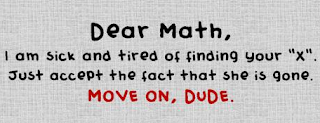


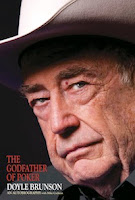








 , calls, and at that point the uncertain Doctor folds his straight. The Congressman then makes it $140 with his full house, to which the Colonel pushes it up a hundred more. Then the Lawyer reraises a hundy on top of that. The Congressman just calls, but when the other two continue to add more to the pot he finally folds his sixes full of queens, giving up the more than $300 he’s contributed to the pot.
, calls, and at that point the uncertain Doctor folds his straight. The Congressman then makes it $140 with his full house, to which the Colonel pushes it up a hundred more. Then the Lawyer reraises a hundy on top of that. The Congressman just calls, but when the other two continue to add more to the pot he finally folds his sixes full of queens, giving up the more than $300 he’s contributed to the pot. to make a winning straight flush. He then rakes the huge pot, though everyone remains tense, still feeling as though “some strange climax was coming, and none could even guess what it could be.”
to make a winning straight flush. He then rakes the huge pot, though everyone remains tense, still feeling as though “some strange climax was coming, and none could even guess what it could be.”
